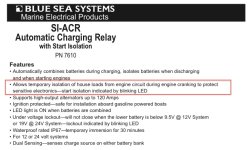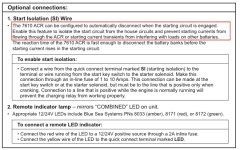Not entirely true--there are a number of recorded instances of electroncis dropping off when large outboards are started even recently. Occasionally there are failures to electronics. What is the cause? We can never be sure, but best to make sure it does not happen. Yes, my experience with damage to electronics I can definately trace to low voltage and spikes, is pre 1990. However that is since 1972, I have wired my electronics to a house bank separated from the start batteries. The engine which caused failure in my case of some very expensive (for the time) wind instruments, was a 22 hp Albin diesel. This was an engine easily started by hand. I don't know the starter current--but probably not much more than a modern 100 hp outboard--if that much. A lot depends on battery condition, the wiring gauge, and how the boat is wired.
I wire the boat so that the electronics are wired to the house battery. Thus they are isolated when the starter is engaged. Under what conditions is the combiner activated when you start the outboard? Answer, if you have the battery charger on when you start the engine. I turn off all 110 volt circuits prior to starting engines.....
So, if you plan on leaving the battery charger on when you start the engine, then it would be of value.


